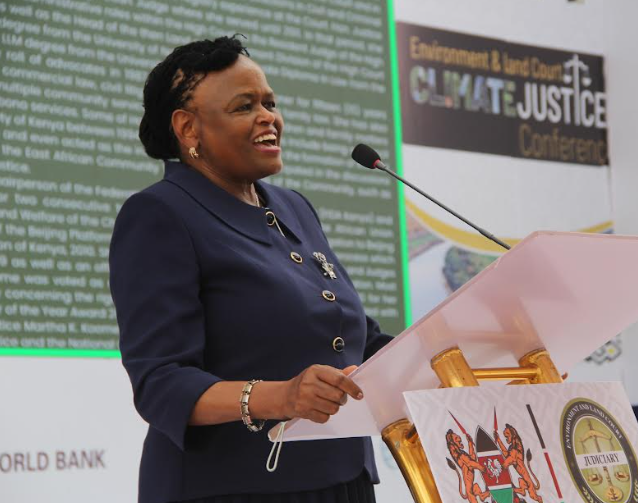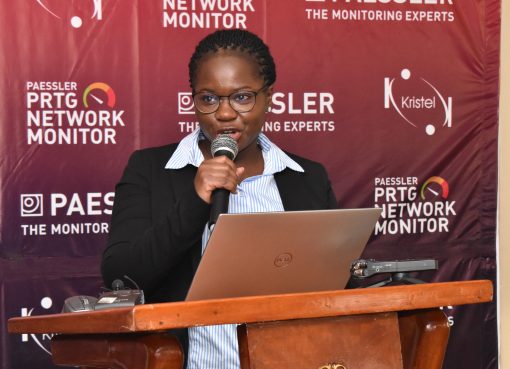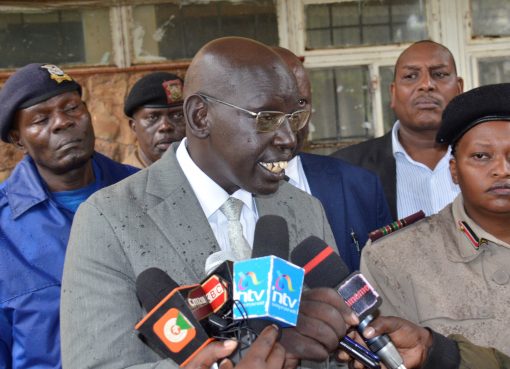Chief Justice Martha Koome has pledged that the Judiciary will chart a path of justice that safeguards both humanity and the planet in matters of climate governance.
Koome said climate change has transcended the scope of an environmental challenge to become a justice and human rights issue, as it cuts across all of the aspects of societal wellbeing.
The Chief Justice advocated for strengthening of policies in order to empower everybody to participate in the protection of the environment.
She identified two existential threats in the country: climate change and corruption, noting that climate change is a challenge that demands serious action not only from policy makers but from every institution including the Judiciary, individuals and communities.
Chief Justice Martha Koome was speaking Tuesday at Moi University School of Law in Eldoret when she presided over the launching ceremony of the Climate Conference spearheaded by the Environment and Land Court.
She commended the Environment and Land Court for convening the timely conference to deliberate on the critical theme of The Role of the Court in Remedying Climate Chaos: A Call for Distributive and Procedural Justice.
Koome said the climate change issue has become worse as it increases inequality and disproportionality and impacts more on the vulnerable and the marginalized groups in society.
Justice Koome emphasized that the global threat demands a justice-centered approach to climate governance, upholding both distributive and procedural justice in order to protect communities in arid and semi-arid areas, subsistence farmers, coastal dwellers, and indigenous peoples, many of whom contribute the least to greenhouse gas emissions but bear the brunt of its consequences.
She noted that the courts are empowered as guardians of environmental rights and distributive equity by the provisions of the Constitution 2010 which enshrines the right to a clean and healthy environment, and principles of sustainable development, and public participation in environmental governance.
The CJ reiterated that in addition, Article 69 obligates the State to eliminate activities that endanger the environment and establish systems promoting sustainable resource use.
“Complementing this constitutional framework is the Climate Change Act of 2016, amended in 2023, which provides a comprehensive regulatory framework for climate change mitigation, adaptation, and low-carbon development. This legislative commitment recognizes humanity’s ecological interconnectedness and dependence on the non-human world,” explained the CJ.
She stressed that special attention must be given to vulnerable and marginalized groups disproportionately affected by climate-related harm, in line with the principle of distributive justice which concerns the equitable allocation of resources, opportunities, and responsibilities.
“In the context of climate change, this requires that the burdens of climate impacts and the benefits of mitigation and adaptation measures be distributed fairly across society.”
Noting that vulnerable populations, including indigenous peoples, women, and children, often face the greatest climate challenges, the CJ reiterated that Courts must actively safeguard their rights by holding public and private actors accountable for environmental harm.
“Courts have the obligation to ensure that policies, environmental impact assessments, and adaptation projects prioritize inclusivity and fairness. Climate justice also requires addressing intergenerational equity. This is a recognition that decisions being made today will profoundly impact future generations,” said the CJ Koome.
Koome who is also president of the Supreme Court, said courts have a vital role to play in ensuring climate action does not leave anyone behind especially in Kenya, where communities face severe droughts, unpredictable rainfall patterns, and resource conflicts through mediating competing interests while upholding equity and fairness.
Uasin Gishu Governor Dr. Jonathan Bii Chelilim noted that Climate change is no longer an abstract concept but a pressing reality affecting every aspect of people’s lives from livelihoods and ecosystems to economies and global stability.
He affirmed the county administration’s commitment to advancing justice and sustainability, strengthened by the collaboration with the Judiciary like the inauguration of new courts and Alternative Justice System (AJS) units in Moiben and Turbo sub-counties which marked a significant milestone for the county in terms of promoting access to justice.
“AJS embodies the principles of equity, sustainability, and social cohesion which are crucial values that are at the heart of this conference’s theme,” he said.

Governor Bii lauded the establishment of the Environment and Land Court division in Kenya which has been transformative in enhancing access to justice, expedited dispute resolution, and clarified jurisdictional complexities.
“Our citizens are now better equipped to distinguish between land use and environmental preservation, a vital step toward sustainable development. These efforts align with distributive and procedural justice, ensuring that all, especially vulnerable communities disproportionately affected by climate change, receive fair resolutions,” added Governor Bii.
He further praised the Alternative Justice System (AJS) which complements distributive and procedural justice by fostering community-driven solutions to resource-based conflicts.
“These resources lie at the heart of climate justice, and AJS should continue promoting equitable, harmonious resolutions that build resilience and mutual understanding.”
The Governor reaffirmed his commitment to supporting courts as arbiters of disputes and architects of a fairer, more sustainable future and improving access to justice, and championing development policies that balance growth with environmental preservation.
By Ekuwam Sylvester





